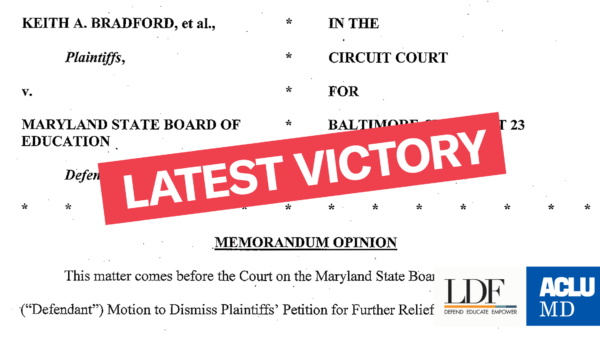Petition Reopens, Seeks to Require Compliance with Rulings in Bradford Class Action Lawsuit that Spurred the Thornton Statewide Education Formula
See an interactive timeline, videos, and legal documents on the Bradford case page.
BALTIMORE –To ensure that another generation of Black and Brown students in Baltimore are not held back from realizing their dreams because of unconstitutional and inequitable education funding, a group of concerned parents and civil rights organizations are returning to court today to reopen the historic Bradford v. Maryland State Board of Education litigation that spurred the “Thornton” statewide funding formula in 2002.
The request filed in the Circuit Court for Baltimore City would reopen the historic Bradford lawsuit that ordered a revamping of the state’s education funding formula. It would also hold the State accountable for its failure to provide the necessary funding to both provide a quality education and to address the abysmal physical conditions of school facilities that disrupt students’ ability to learn.
“We must invest in our future leaders, which is our children today!” said Angela Gant, mother of two children currently in Baltimore City Public Schools. “Our children have the right to a great education. They need access to the tutoring and support resources in schools that help them learn and thrive.”
According to the state Department of Legislative Services, the gap between what was judged by the State to be required for the Baltimore City Public School System (BCPSS) to provide a quality education and what was actually funded – was $290 million in FY 2015. An independent analysis mandated by the General Assembly for that year found BCPSS deserved $358 million. Over time, Baltimore City students have been deprived of over $2 billion in constitutionally required funding.
These numbers affect tens of thousands of children in Baltimore City schools, most of whom are Black and Brown and whose families live in poverty. Stefanie Croslin’s 13-year-old son, Cohen, loves science, but his school does not have Bunsen burners or an eye wash station, much less the advanced computer technology available in neighboring Baltimore County. Teachers, instead, have had to collect materials donated by parents to design experiments. Ms. Croslin worries what will happen if he never receives the learning necessary to succeed in college. Similarly, her younger son, 11-year-old Cyrus, was devastated when his school had to cancel music class. It was his favorite subject.
Most parents of children in Baltimore City schools have stories like these. Angela Gant’s younger daughter, 14-year-old D’Nyah, used to excel in math, but she recently began to struggle. Ms. Gant wants to help her, but her school no longer offers the tutoring services that were available when her older daughter graduated. Deshawna Bryant has sickle cell anemia and spent a week in the hospital after a day in an unheated classroom last winter. These problems mirror those highlighted when the Bradford case was originally filed, almost a quarter of a century ago.
“I would like our leaders to know that students in Baltimore also have a dream, and just because some of us aren’t rich enough to have those dreams come true doesn’t mean they should be taken away from us,” said Deshawna Bryant, a senior at City College High School in Baltimore. “The fact that we don’t have heating or air conditioning or all this funding, takes away from those dreams and it makes it harder for people to want to go to college.”
The plaintiffs in Bradford v. Maryland State Board of Education, a case pending in the Circuit Court for Baltimore City, are a class of parents of students attending public schools in Baltimore City, represented by the American Civil Liberties Union (ACLU) of Maryland, the NAACP Legal Defense and Educational Fund (LDF), and BakerHostetler. In 1996, the Circuit Court in Bradford declared that students in Baltimore City were not receiving the “thorough and efficient” public school education to which they are entitled under Article VIII of the Maryland Constitution. In later rulings, the Court repeatedly found that the State was continuing to violate its constitutional duty to Baltimore City students, including providing insufficient funding for an adequate education, as judged by contemporary standards.
“Our children cannot wait any longer,” said Dana Vickers Shelley, Executive Director of the ACLU of Maryland. “For decades, the State of Maryland has abdicated its responsibility to provide adequate funding for both instruction and to address the abysmal physical condition of school facilities in Baltimore City.”
Baltimore City’s school buildings are by far the oldest in the state. Over 80 percent of the system’s 158 schools are in “very poor” or “poor” condition. The well-documented problems include lack of drinkable water due to un-remediated lead in water pipes, ancient boiler systems, roofs in need a replacement, and deficient electrical and fire safety systems.
“For decades the State of Maryland has allowed Baltimore City schools to deteriorate, failing to provide the needed funding to give thousands of African-American and Latinx students the quality education they deserve,” said Ajmel Quereshi, LDF Senior Counsel. “The State must take meaningful action to ensure that Baltimore City schools are safe, functional, and have the adequate staffing and infrastructure in place so students can learn and thrive.”
Baltimore lacks the resources that other jurisdictions of comparable size use to supplement their school maintenance and construction budgets. This means Baltimore must pay for many emergency repairs and renovations to facilities out of its operating budget, which unavoidably diverts dollars from instruction. In addition, many Baltimore schools also lack the range of specialized facilities necessary to meet contemporary educational standards, such as computer and STEM-related facilities and art, music, and after-school programs. Taken together, this drain on already meager funding resources exacerbates the constitutional “adequacy gap” in an area where a majority of the students are Black, Brown and from families with low-incomes.
The ACLU has worked to ensure that the needs of students in Baltimore City – and other jurisdictions that have higher concentrations of poverty and majority Black and Brown student enrollments – are fully funded in the recommendations of the State’s Commission on Innovation and Excellence in Education, the “Kirwan” Commission. But the Kirwan Commission has repeatedly delayed its final report and the funding needs of students in Baltimore City seem unlikely to be fully addressed during the 2019 General Assembly.
The plaintiffs are represented by Elizabeth B. McCallum from BakerHostetler; Ajmel Quereshi and Cara McClellan from the NAACP Legal Defense and Educational Fund; and Deborah Jeon from the ACLU of Maryland.
Learn more about the Bradford lawsuit online: https://www.aclu-md.org/bradford
###
Stay Informed
Sign up to be the first to hear about how to take action.
By completing this form, I agree to receive occasional emails per the terms of the ACLU’s privacy statement.
By completing this form, I agree to receive occasional emails per the terms of the ACLU’s privacy statement.


